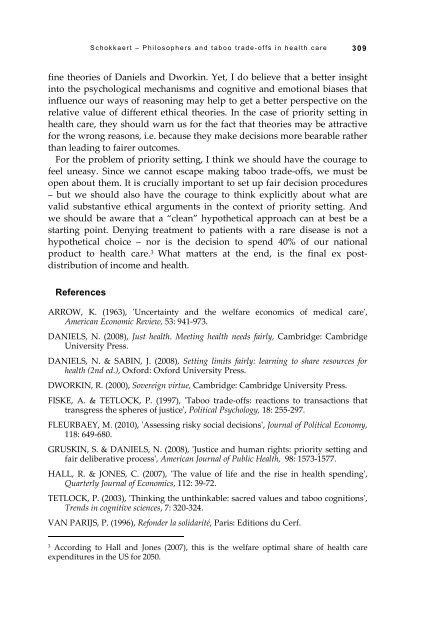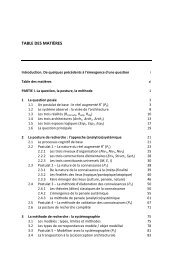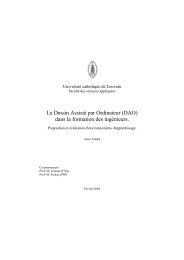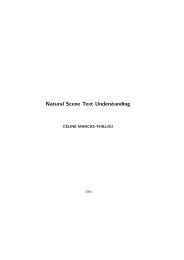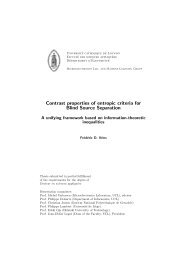- Page 5 and 6:
© Presses universitaires de Louvai
- Page 7 and 8:
6A r g u i n g a b o u t j u s t i
- Page 9 and 10:
8A r g u i n g a b o u t j u s t i
- Page 11 and 12:
10A r g u i n g a b o u t j u s t i
- Page 13 and 14:
12A r g u i n g a b o u t j u s t i
- Page 15 and 16:
14A r g u i n g a b o u t j u s t i
- Page 17 and 18:
16A r g u i n g a b o u t j u s t i
- Page 19 and 20:
18A r g u i n g a b o u t j u s t i
- Page 21 and 22:
20A r g u i n g a b o u t j u s t i
- Page 23 and 24:
22A r g u i n g a b o u t j u s t i
- Page 25 and 26:
24A r g u i n g a b o u t j u s t i
- Page 27 and 28:
26A r g u i n g a b o u t j u s t i
- Page 29 and 30:
28A r g u i n g a b o u t j u s t i
- Page 31 and 32:
30A r g u i n g a b o u t j u s t i
- Page 33 and 34:
32A r g u i n g a b o u t j u s t i
- Page 35 and 36:
34A r g u i n g a b o u t j u s t i
- Page 37 and 38:
36A r g u i n g a b o u t j u s t i
- Page 39 and 40:
38A r g u i n g a b o u t j u s t i
- Page 41 and 42:
40A r g u i n g a b o u t j u s t i
- Page 43 and 44:
42A r g u i n g a b o u t j u s t i
- Page 45 and 46:
44A r g u i n g a b o u t j u s t i
- Page 47 and 48:
46A r g u i n g a b o u t j u s t i
- Page 50 and 51:
Marriages as assets?Real freedom an
- Page 52 and 53:
A l s t o t t - M a r r i a g e s a
- Page 54 and 55:
A l s t o t t - M a r r i a g e s a
- Page 56 and 57:
A l s t o t t - M a r r i a g e s a
- Page 58 and 59:
A l s t o t t - M a r r i a g e s a
- Page 60 and 61:
A l s t o t t - M a r r i a g e s a
- Page 62 and 63:
The guaranteed income as an equalop
- Page 64 and 65:
A r n s p e r g e r & J o h n s o n
- Page 66 and 67:
A r n s p e r g e r & J o h n s o n
- Page 68 and 69:
A r n s p e r g e r & J o h n s o n
- Page 70:
A r n s p e r g e r & J o h n s o n
- Page 73 and 74:
72A r g u i n g a b o u t j u s t i
- Page 75 and 76:
74A r g u i n g a b o u t j u s t i
- Page 77 and 78:
76A r g u i n g a b o u t j u s t i
- Page 80 and 81:
Reflections on the limits of argume
- Page 82 and 83:
B a k e r - R e f l e c t i o n s o
- Page 84 and 85:
B a k e r - R e f l e c t i o n s o
- Page 86 and 87:
B a k e r - R e f l e c t i o n s o
- Page 88 and 89:
Taxation, fees and social justiceFr
- Page 90 and 91:
B l a i s - T a x a t i o n , f e e
- Page 92 and 93:
B l a i s - T a x a t i o n , f e e
- Page 94 and 95:
Real freedomfor all turtles in Suga
- Page 96 and 97:
B o u l a n g e r - R e a l f r e e
- Page 98 and 99:
B o u l a n g e r - R e a l f r e e
- Page 100 and 101:
B o u l a n g e r - R e a l f r e e
- Page 102 and 103:
B o u l a n g e r - R e a l f r e e
- Page 104 and 105:
B o u l a n g e r - R e a l f r e e
- Page 106 and 107:
Linguistic diversityand economic se
- Page 108 and 109:
B o w l e s - L i n g u i s t i c d
- Page 110 and 111:
B o w l e s - L i n g u i s t i c d
- Page 112 and 113:
B o w l e s - L i n g u i s t i c d
- Page 114 and 115:
B o w l e s - L i n g u i s t i c d
- Page 116 and 117:
Legitimate partiality, parents and
- Page 118 and 119:
B r i g h o u s e & S w i f t - L e
- Page 120 and 121:
B r i g h o u s e & S w i f t - L e
- Page 122 and 123:
B r i g h o u s e & S w i f t - L e
- Page 124:
B r i g h o u s e & S w i f t - L e
- Page 127 and 128:
126A r g u i n g a b o u t j u s t
- Page 129 and 130:
128A r g u i n g a b o u t j u s t
- Page 131 and 132:
130A r g u i n g a b o u t j u s t
- Page 133 and 134:
132A r g u i n g a b o u t j u s t
- Page 136 and 137:
Distributing freedom over whole liv
- Page 138 and 139:
C a r t e r - D i s t r i b u t i n
- Page 140 and 141:
C a r t e r - D i s t r i b u t i n
- Page 142 and 143:
C a r t e r - D i s t r i b u t i n
- Page 144:
C a r t e r - D i s t r i b u t i n
- Page 147 and 148:
146A r g u i n g a b o u t j u s t
- Page 149 and 150:
148A r g u i n g a b o u t j u s t
- Page 151 and 152:
150A r g u i n g a b o u t j u s t
- Page 153 and 154:
152A r g u i n g a b o u t j u s t
- Page 155 and 156:
154A r g u i n g a b o u t j u s t
- Page 158 and 159:
Why do we blame survivors?Jean-Mich
- Page 160 and 161:
C h a u m o n t - W h y d o w e b l
- Page 162 and 163:
C h a u m o n t - W h y d o w e b l
- Page 164 and 165:
C h a u m o n t - W h y d o w e b l
- Page 166:
C h a u m o n t - W h y d o w e b l
- Page 169 and 170:
168A r g u i n g a b o u t j u s t
- Page 171 and 172:
170A r g u i n g a b o u t j u s t
- Page 173 and 174:
172A r g u i n g a b o u t j u s t
- Page 175 and 176:
174A r g u i n g a b o u t j u s t
- Page 177 and 178:
176A r g u i n g a b o u t j u s t
- Page 179 and 180:
178A r g u i n g a b o u t j u s t
- Page 181 and 182:
180A r g u i n g a b o u t j u s t
- Page 183 and 184:
182A r g u i n g a b o u t j u s t
- Page 185 and 186:
184A r g u i n g a b o u t j u s t
- Page 187 and 188:
186A r g u i n g a b o u t j u s t
- Page 189 and 190:
188A r g u i n g a b o u t j u s t
- Page 191 and 192:
190A r g u i n g a b o u t j u s t
- Page 193 and 194:
192A r g u i n g a b o u t j u s t
- Page 195 and 196:
194A r g u i n g a b o u t j u s t
- Page 197 and 198:
196A r g u i n g a b o u t j u s t
- Page 199 and 200:
198A r g u i n g a b o u t j u s t
- Page 201 and 202:
200A r g u i n g a b o u t j u s t
- Page 203 and 204:
202A r g u i n g a b o u t j u s t
- Page 205 and 206:
204A r g u i n g a b o u t j u s t
- Page 207 and 208:
206A r g u i n g a b o u t j u s t
- Page 209 and 210:
208A r g u i n g a b o u t j u s t
- Page 211 and 212:
210A r g u i n g a b o u t j u s t
- Page 213 and 214:
212A r g u i n g a b o u t j u s t
- Page 215 and 216:
214A r g u i n g a b o u t j u s t
- Page 217 and 218:
216A r g u i n g a b o u t j u s t
- Page 219 and 220:
218A r g u i n g a b o u t j u s t
- Page 221 and 222:
220A r g u i n g a b o u t j u s t
- Page 223 and 224:
222A r g u i n g a b o u t j u s t
- Page 225 and 226:
224A r g u i n g a b o u t j u s t
- Page 227 and 228:
226A r g u i n g a b o u t j u s t
- Page 230 and 231:
English or Esperanto:a case for lev
- Page 232 and 233:
F l e u r b a e y - E n g l i s h o
- Page 234 and 235:
F l e u r b a e y - E n g l i s h o
- Page 236:
F l e u r b a e y - E n g l i s h o
- Page 239 and 240:
238A r g u i n g a b o u t j u s t
- Page 241 and 242:
240A r g u i n g a b o u t j u s t
- Page 243 and 244:
242A r g u i n g a b o u t j u s t
- Page 245 and 246:
244A r g u i n g a b o u t j u s t
- Page 247 and 248:
246A r g u i n g a b o u t j u s t
- Page 249 and 250:
248A r g u i n g a b o u t j u s t
- Page 251 and 252:
250A r g u i n g a b o u t j u s t
- Page 253 and 254:
252A r g u i n g a b o u t j u s t
- Page 255 and 256:
254A r g u i n g a b o u t j u s t
- Page 257 and 258:
256A r g u i n g a b o u t j u s t
- Page 259 and 260: 258A r g u i n g a b o u t j u s t
- Page 262 and 263: Should a Marxistbelieve in human ri
- Page 264 and 265: L a c r o i x - S h o u l d a M a r
- Page 266 and 267: L a c r o i x - S h o u l d a M a r
- Page 268: L a c r o i x - S h o u l d a M a r
- Page 271 and 272: 270A r g u i n g a b o u t j u s t
- Page 273 and 274: 272A r g u i n g a b o u t j u s t
- Page 275 and 276: 274A r g u i n g a b o u t j u s t
- Page 277 and 278: 276A r g u i n g a b o u t j u s t
- Page 279 and 280: 278A r g u i n g a b o u t j u s t
- Page 281 and 282: 280A r g u i n g a b o u t j u s t
- Page 284 and 285: A universal duty to careIngrid Robe
- Page 286 and 287: R o b e yn s - A u n i v e r s a l
- Page 288 and 289: R o b e yn s - A u n i v e r s a l
- Page 290 and 291: R o b e yn s - A u n i v e r s a l
- Page 292 and 293: The ideological roots of inequality
- Page 294 and 295: R o e m e r - T h e i d e o l o g i
- Page 296 and 297: R o e m e r - T h e i d e o l o g i
- Page 298 and 299: R o e m e r - T h e i d e o l o g i
- Page 300 and 301: R o e m e r - T h e i d e o l o g i
- Page 302 and 303: R o e m e r - T h e i d e o l o g i
- Page 304 and 305: Philosophers andtaboo trade-offs in
- Page 306 and 307: S c h o k k a e r t - P h i l o s o
- Page 308 and 309: S c h o k k a e r t - P h i l o s o
- Page 312 and 313: Multilingual democracyand public sp
- Page 314 and 315: S i n a r d e t - M u l t i l i n g
- Page 316 and 317: S i n a r d e t - M u l t i l i n g
- Page 318 and 319: S i n a r d e t - M u l t i l i n g
- Page 320: S i n a r d e t - M u l t i l i n g
- Page 323 and 324: 322A r g u i n g a b o u t j u s t
- Page 325 and 326: 324A r g u i n g a b o u t j u s t
- Page 327 and 328: 326A r g u i n g a b o u t j u s t
- Page 329 and 330: 328A r g u i n g a b o u t j u s t
- Page 331 and 332: 330A r g u i n g a b o u t j u s t
- Page 333 and 334: 332A r g u i n g a b o u t j u s t
- Page 335 and 336: 334A r g u i n g a b o u t j u s t
- Page 338 and 339: Towards an unconditionalbasic incom
- Page 340 and 341: S u p l i c y - T o w a r d s a n u
- Page 342 and 343: S u p l i c y - T o w a r d s a n u
- Page 344 and 345: S u p l i c y - T o w a r d s a n u
- Page 346 and 347: S u p l i c y - T o w a r d s a n u
- Page 348 and 349: Is it always betterto clear up misu
- Page 350 and 351: V a n C a m p e n h o u d t - I s i
- Page 352 and 353: V a n C a m p e n h o u d t - I s i
- Page 354 and 355: V a n C a m p e n h o u d t - I s i
- Page 356 and 357: Why auntie's boring tea partiesmatt
- Page 358 and 359: v a n d e r V e e n - W h y a u n t
- Page 360 and 361:
v a n d e r V e e n - W h y a u n t
- Page 362 and 363:
v a n d e r V e e n - W h y a u n t
- Page 364 and 365:
v a n d e r V e e n - W h y a u n t
- Page 366:
v a n d e r V e e n - W h y a u n t
- Page 369 and 370:
368A r g u i n g a b o u t j u s t
- Page 371 and 372:
370A r g u i n g a b o u t j u s t
- Page 373 and 374:
372A r g u i n g a b o u t j u s t
- Page 375 and 376:
374A r g u i n g a b o u t j u s t
- Page 378 and 379:
Self-determination for (some) citie
- Page 380 and 381:
W e i n s t o c k - S e l f - d e t
- Page 382 and 383:
W e i n s t o c k - S e l f - d e t
- Page 384 and 385:
W e i n s t o c k - S e l f - d e t
- Page 386:
W e i n s t o c k - S e l f - d e t
- Page 389 and 390:
388A r g u i n g a b o u t j u s t
- Page 391 and 392:
390A r g u i n g a b o u t j u s t
- Page 393 and 394:
392A r g u i n g a b o u t j u s t
- Page 395 and 396:
394A r g u i n g a b o u t j u s t
- Page 397 and 398:
396A r g u i n g a b o u t j u s t
- Page 399 and 400:
398A r g u i n g a b o u t j u s t
- Page 401 and 402:
400A r g u i n g a b o u t j u s t
- Page 403 and 404:
402A r g u i n g a b o u t j u s t
- Page 405 and 406:
404A r g u i n g a b o u t j u s t
- Page 407 and 408:
406A r g u i n g a b o u t j u s t
- Page 409 and 410:
408A r g u i n g a b o u t j u s t
- Page 411 and 412:
410A r g u i n g a b o u t j u s t
- Page 413 and 414:
412A r g u i n g a b o u t j u s t
- Page 416 and 417:
The capitalist road to communism:ar
- Page 418 and 419:
Z e l l e k e - T h e c a p i t a l
- Page 420 and 421:
Z e l l e k e - T h e c a p i t a l
- Page 422 and 423:
Z e l l e k e - T h e c a p i t a l


